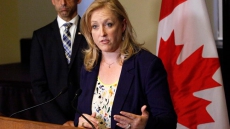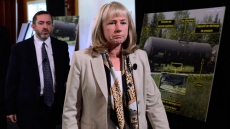Telecom industry heavyweights were meeting Thursday to figure out what to do about the fees they impose on consumers who want to receive paper bills instead of on-line invoices.
Executives from nearly a dozen companies, including giants Bell, Rogers and Telus, are discussing the issue at a session called by the Canadian Radio-television and Telecommunications Commission.
The CRTC told participants in a letter that they would be expected to discuss the consumer issues related to paper bill fees. The letter also suggested the telecom watchdog wanted decisions to be made during the gathering.
While the meeting was scheduled two weeks ago, it comes one day after a new report estimated that Canadians pay up to $734 million every year in fees simply in order to receive their monthly bills on paper.
The report from the Public Interest Advocacy Centre recommends getting rid of the fees — something the Harper Conservatives have said they want to see.
"Our government will end 'pay to pay' policies, so customers won't pay extra to receive paper bills," the Tories promised in their October 2013 throne speech, a pledge that was repeated in the 2014 budget.
But at least one company taking part in today's meeting says the fees are both fair and environmentally friendly.
Telus said a small minority of its customers who have Internet access pay a $2 fee to get their bills through the mail, rather than electronically. The company said it uses the money to offset the cost of printing and mailing.
Customers without Internet access or who are visually impaired are not charged, Telus noted.
Other companies also charge for paper bills — up to $6 per month in some cases — but both the fees and exemption policies vary widely.
Rogers, for instance, has been known to waive its $2 fee if customers object for various reasons.
"We think online billing gives customers many advantages over paper bills, like additional tools and resources to help them manage their bill and accounts online, but we recognize online billing is not for everyone," said Rogers spokeswoman Patricia Trott.
"Our policy is to make exceptions to our paper bill fee for customers who don’t have access to the Internet, seniors and people with disabilities."
Rogers used to direct the money it collected from the fees to supporting youth and basic skills education programs as part of the Rogers Youth Fund.
However, it no longer does that, citing dwindling returns from pay-to-pay fees as more customers switch to online billing, and a need to provide the youth fund with a stable source of revenue.
The advocacy centre recommends that the companies should offer discounts to customers who choose to receive invoices electronically, instead of charging fees.
That call has been echoed by the federal Opposition New Democrats, who call the fees a "cash grab."
NDP multiculturalism critic Andrew Cash, who has been fighting the fees for years, dismissed the environmental argument.
"If it's costing them so much money to send out a bill, then they should be passing on those savings (from electronic billing) to their customers, which they haven't done," said Cash.
"These fees unfairly target some of our more vulnerable communities in Canada," he said, pointing to seniors and other people on fixed incomes who may not have easy access to the Internet.
Electronic billing has been widely available since 2001, but banking and communications services companies only started charging for paper bills in 2010.





